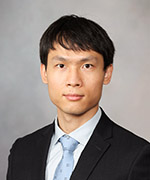Translating medical device innovations from the lab to the patient bedside: an example of the Vortex Catheter
Date: 2021/10/20 - 2021/10/20
Academic Seminar: Translating medical device innovations from the lab to the patient bedside: an example of the Vortex Catheter
Speaker: Dr. Yang Liu, Mayo Clinic-Rochester
Time: 9:00 a.m.-10:00 a.m., Oct 20th, 2021 (Beijing Time)
Location: via Feishu
Abstract
Stroke is the No. 1 cause of death in China and poses a great societal and economic burden to the aging population. Over 80% of all stroke cases are caused by blood clots occluding the vessels supplying blood to the brain. For large vessel occlusion which accounts for about 1/3 of all stoke cases, using catheter-based thrombectomy devices to endovascularly and mechanically remove clots have become the standard of care since 2015. Although thrombectomy devices have evolved for about 20 years, clinical challenges persist, such as complete clot removal is achieved only in about 50% of the cases and multiple device passes increase the procedure time and worsen patient outcome. To address the challenges and understand why current thrombectomy devices fail, we investigated the tissue mechanics of clots retrieved from stroke patients and created clot analogs to mimic the mechanical interaction with thrombectomy devices and tested thrombectomy in preclinical (both in vitro and in vivo animal) models. To circumvent the failure modes we unraveled for current thrombectomy devices, utilizing the advances in soft tissue cutting and fluid dynamics, we developed a thrombectomy catheter that can remove large burden of clots in situ. In this talk, I will demonstrate how a close collaboration between engineers and clinicians can translate medical device innovations from the lab to the patient bedside in an academic setting.
Biography
 Yang Liu is a research fellow with the academic rank of assistant professor at Mayo Clinic-Rochester. He received his Ph.D. degree in Mechanical Engineering from the University of Michigan in 2019 and his B.S. degree (with a minor in Finance) in Mechanical Engineering from the University of Michigan-Shanghai Jiao Tong University Joint Institute in 2014. Yang received the Tech Transfer Talent Network Postdoc Fellowship at the University of Michigan, Pryor-Hale Award for Best Business at the Michigan Business Challenge, and Best Paper Finalist in the ASME Manufacturing Science and Engineering Conference. Yang published over 30 journal papers and is a co-inventor of three international patents. Yang is on the Scientific Advisory Board of Endovascular Engineering Inc which is developing medical devices for cardiovascular diseases.
Yang Liu is a research fellow with the academic rank of assistant professor at Mayo Clinic-Rochester. He received his Ph.D. degree in Mechanical Engineering from the University of Michigan in 2019 and his B.S. degree (with a minor in Finance) in Mechanical Engineering from the University of Michigan-Shanghai Jiao Tong University Joint Institute in 2014. Yang received the Tech Transfer Talent Network Postdoc Fellowship at the University of Michigan, Pryor-Hale Award for Best Business at the Michigan Business Challenge, and Best Paper Finalist in the ASME Manufacturing Science and Engineering Conference. Yang published over 30 journal papers and is a co-inventor of three international patents. Yang is on the Scientific Advisory Board of Endovascular Engineering Inc which is developing medical devices for cardiovascular diseases.
